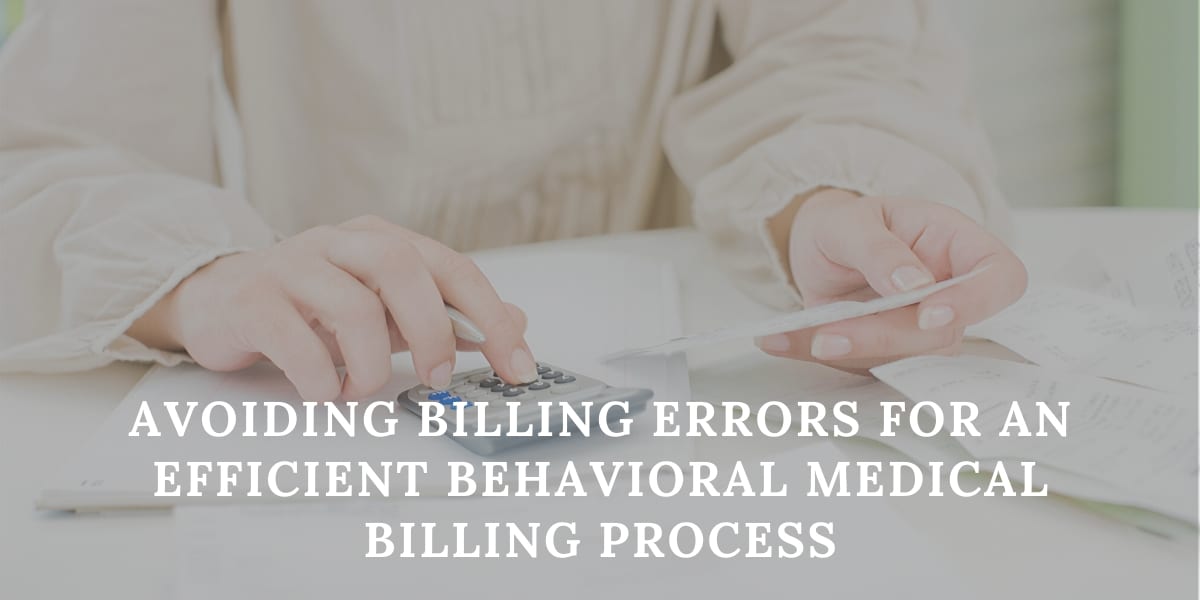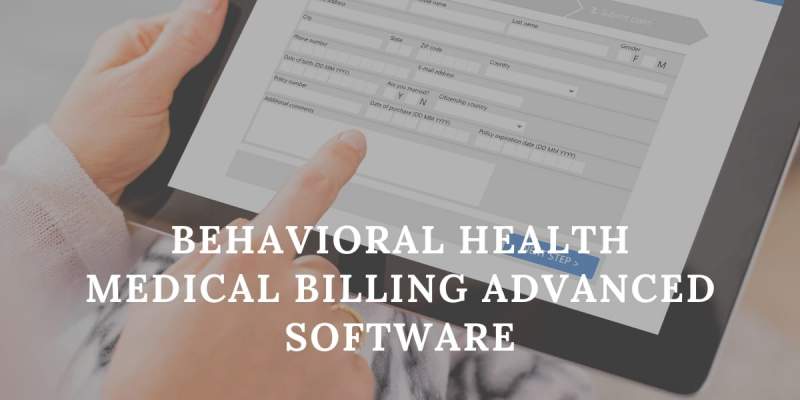
Avoiding Billing Errors for an Efficient Behavioral Medical Billing Process
Medical billing can be a crucial, but complicated process. It constitutes one of the most vital components of the health care industry, especially the behavioral healthcare sector. What makes the behavioral medical billing process concerning is the frequent billing errors that are pervasive throughout the industry.
Errors in coding are frequent sights to witness, especially when it comes to behavioral health, as such the diagnosis, treatment and coverage for a patient can be extremely messy. This, in turn, makes the claim submission process messy, resulting in most cases with denial of the claim.
Prominent Billing Errors
If we have any chance of combatting the issue of billing, we must first try to understand its cause. Some of the most common errors are listed below.
Clerical Errors
Errors such as incorrect spellings, typos in insurance ID’s are a major reason for insurance firms denying claims. The name, contact, and address of both the provider and insurance company could be entered incorrectly. This is because the medical bills can be influenced and changed by dozens of people, hence such errors are common
Outdated Information
Apart from incorrect information, outdated or obsolete information can also put a wrench in your claim approval ambitions. Outdated information may come from the patient themselves. Claims can be rejected if data is found to be outdated; hence keeping data up-to-date is crucial.
Incorrect Quantities
An incorrectly entered quantity can end up charging the patient extra. Even erroneously adding a zero at the end of a number might widely exaggerate the cost of the treatment. Such errors should be avoided at all costs.
Messy Documentation
Most physicians have illegible handwriting. At this point, this has developed into a cliché amongst various medical professionals. However, this can also result in claim rejections as the handwritten documents are simply too messy to be comprehensive.
Double Billing
Double billing, unfortunately, is a common Behavioral medical billing mistake that has been going on since time immemorial. A patient might be charged twice, once by the doctor and once by a nurse who wasn’t aware of the doctor’s actions. A patient might also be charged twice for both drugs prescribed and drugs administered.
Undercoding
Undercoding occurs when the act of behavioral medical billing for a service is less expensive than the treatment provided, or leaving out codes altogether. Patients might be undercoded by providers to minimize patient’s costs or avoid any audits. Unlike other errors, this error affects the provider more than the patients.
Upcoding
Upcoding occurs when the act of billing for a service is more expensive than the treatment provided. This happens when a billing code is incorrectly changed to represent a more severe treatment or diagnosis. Upcoding has been deemed illegal and can also inflate a medical bill.
Incorrect or Mismatched Codes
Incorrect or mismatched codes can occur when a provider upcodes a patient’s diagnosis without changing his billing code. Mismatched codes can also inflate claims due to upcoding.
Unbundling
Unbundling is an act of billing for individual services that can be covered under a less expensive treatment plan. This basically means that charges which were typically falling under one code are now being listed separately.
Best Practices to Avoid Billing Errors
With the above causes now crystal clear, let’s look at some of the best practices that can help you avoid billing errors, and thus prevent claim rejections.
- • Double Check Patient’s Personal Information
This is probably one of the easiest ways to avoid medical billing errors-simply verify and re-verify your patient’s personal information. Make sure all the information submitted by them is correct and devoid of any silly mistakes and omissions. - • Double Check Patient’s Insurance Information
Make sure to call your patient’s insurance company before you provide them with your services. Check whether their policy number and coverage are the same and that you have updated billing contact information. - • Establish a policy to compile billing information
Establish a clear and precise policy that communicates accurately how billing information needs to be handled and managed by your staff. You have to ensure your patients aren’t being charged twice, hence make one person-in-charge of monitoring and managing the staff that handles billing. - • Follow up on your claims
You can avoid errors by simply being diligent in your follow-ups with insurance companies. A representative working on your claim might be able to inform you of errors, allowing you to rectify and re-submit a polished claim again. - • Establish Clear Communication and Co-ordination
Everyone working on a claim in your staff should be well aware of their roles and responsibilities. They should also be well organized and coordinated to know how to communicate with each other effectively. Stay up-to-date It is crucial that you stay up-to-date with your claim process and avoid the entry of any kind of obsolete information from your documentation.
DENmaar’s Mental Health Medical Billing Service
As you can guess from the article, behavioral health medical billing is not a walk in the park. A lot of effort, blood, and sweat goes into the entire process. It can be time-consuming and really frustrating for mental health practitioners who just want to tend to their client’s needs.
Here at DENmaar, we partner with concerned practitioners to offer pre-authorization, third party billing, claims follow-up, and to assist with appeals for any denied insurance claims. With DENmaar, you get the assistance of our behavioral health billing specialists to make your billing process easier than ever.
Learn More
Behavioral Medical Billing VS Conventional Medical Billing
Behavioral medical billing is one thing that mental health practitioners simply wish to do away with. It is a special kind of frustration that is conjured when you try to file insurance claims for mental and behavioral health benefits.
Due to the types of services offered, or the pre-authorization needed, the challenges that mental health practitioners face are unlike any their contemporaries have to deal with.
What Makes Mental Health Billing so Complicated?
Lack of a standardized process as compared to other practices would be a simple answer to this question. In a Behavioral health practice, there are a number of variants when it comes to types of services offered. Major time in behavioral healthcare is spent on therapy sessions. Insurance companies take note of how long the duration of these treatments can go for, as well as how many of these sessions can take place in a day. Both counselors and psychiatrists simply have a very different way of dispensing their services.
These make it very difficult for them to balance their treatments with an adequate billing system. Another area that clearly distinguishes mental health billing from other conventional billing plans is the fact that the problems with behavioral medical billing are only amplified by office budgets.
Counselors will often try to process their own bills, to cut down on operation costs for their private practices. The lack of dedicated staff to update billing codes for behavioral health, changing regulations, and billing practices for each of the respective insurance companies, will result in rejection rates skyrocketing.
If you want to process your claims quicker, then the following can help:
File within the time allotted by the insurance company
Use only the billing format required by your client’s insurance company
Use the appropriate code for the delivered treatment
Limit the bill’s total to the fee allowed by your client’s insurance policy
Use the appropriate policy number for the bill claim
Submit the claim to the right address
Receive pre-approval for treatment as needed by the insurance plan
On average, only 85 percent of claims for behavioral healthcare is approved. Improving these approval rates is the biggest challenge facing behavioral healthcare providers today.
Make it a habit to double-check your client’s insurance plan before each and every visit. Sudden policy changes and lapses in coverage are common in the world of health insurance. Try to stay ahead of the game for your own benefit.
Be up-to-date on each of your client’s insurance company filing methods. Paper and fax have become a thing of the past, and are now being replaced by email, and online filing services. Stay in touch with the insurance companies, as you don’t know when they will change their billing method.
DENmaar’s Behavioral Health Medical Billing Services.
As you can guess from the article, medical billing for mental health is not a walk in the park. A lot of effort, blood, and sweat goes into the entire process. It can be time-consuming and really frustrating for mental health practitioners who just want to tend to their client’s needs.
Here at DENmaar, we partner with concerned practitioners to offer pre-authorization, third party billing, claims follow-up, and to assist with appeals for any denied insurance claims. With DENmaar, you get the assistance of our behavioral medical billing consultants to make your billing process easier than ever.
Learn More
Guidelines for a Convenient Behavioral Health Medical Billing Process
Medical billing on its own is a seriously complicated process. However, medical billing for mental health is a whole new level of the headache-inducing choir. It comes with its own set of unique and complex challenges. When you take into consideration the size and time availability of office staff, unbundling concerns, pre-authorization, etc., behavioral health practitioners are always at a disadvantage compared to their contemporaries in other fields
Understanding the process of behavioral health medical billing is the only way for mental health practitioners to achieve salvation. As then and only then can practitioners spend more time and money on something that matters to them beyond everything else – their patients.
Having emphasized the importance of comprehending the process, we at DENmaar have designed an intricate and precise behavioral health billing software that aims to lift the unnecessary weight of medical billing off your shoulders, thus allowing you to focus on what you are good at, which is tending to your patients.
What Makes Medical Billing for Mental Health So Difficult
The variety in the types of services, the time, scope, and restraints put on mental health treatments, all of them work in conjunction to make the medical billing very difficult. For practices other than mental health, the process is easily standardized; hence the medical billing process remains fairly easier to understand and implement.
However, the very volatile and diverse nature of behavioral health treatment doesn’t allow the luxury of convenient medical billing to those who practice it. Behavioral health treatment differs vastly. The session length, the therapeutic approach, the location in which services are rendered – all contribute to the complex nature of behavioral health medical billing.
Behavioral Health Billing Guidelines
So how can you, as a Mental and behavioral health practitioner, combat the tedious nature of medical billing? Read on for the answer.
1. Double Check Each Patient’s Insurance and Coverage
The very first thing you need to do as a responsible mental health practitioner is to learn about each of your patient’s insurance plans and coverages before each visit. Although this may sound like a time-consuming choir, knowing each and every patient’s insurance plan will reap greater returns in the end.
You can check all of your prospective client’s coverages by conducting verification of benefits for each of your patients before you begin treatment or serving the client in any manner.
Verification of benefits allows providers to unearth important information that is not available in the patient’s insurance card. By checking the VOB, you can rest assured knowing that they are insured for the services they are getting from you and will know how much the insurance company is willing to pay for the services of a client.
Many insurance companies provide online provider portals that can be used to perform verification of benefits by the provider. If a portal is not available, then you can directly call the insurance company to gather the needed information.
To conclude, it is very important to know the coverage and insurance plan of all of your patients, so you don’t end up with rejected claims and unpaid bills.
2. Understand CPT Codes
CPT or ‘common procedural technology’ are codes used by insurance providers to determine the amount of reimbursement to be delivered to healthcare facilities. When dealing with billing, it is imperative to know the associated behavioral health codes for billing. It is extremely crucial to understand the services your facility offers and its respective CPT codes.
Some mental health practitioners use the same CPT codes for all their services. This is illegal, and we recommend our clients never to do such a thing. There are two types of CPT codes available for behavioral health practitioners – E/M Codes and Psychiatric Evaluation Codes
E/M Codes are used to evaluate new medical issues and must have three documentation elements provided. They are:
- History
- Medical Examination
- Medical Decision Making
On the other hand, Psychiatric Evaluation Codes are used for diagnostic assessment. It can include E/M services, but the time associated with E/M services is not counted.
3. Submit Claims Properly
For you to get reimbursed for a claim without a hassle, not only do you need to file the correct code in reference to the correct insurer, but also submit the claim in the correct billing format. Make sure that you are well aware of the insurance companies filing method, and that you do file within the time allotted to you by the insurance company.
Learn More: How to Handle Claim Denials & Maximize Reimbursements
DENmaar’s Mental Health Medical Billing Service
As you can guess from the article, medical billing for mental health is not a walk in the park. A lot of effort, blood, and sweat goes into the entire process. It can be time-consuming and really frustrating for mental health practitioners who just want to tend to their client’s needs.
Here at DENmaar, we partner with concerned practitioners to offer pre-authorization, third party billing, claims follow-up, and to assist with appeals for any denied insurance claims. With DENmaar, you get the assistance of our medicare behavioral health billing specialists to make your billing process easier than ever. Call us on 844-727-3627 to get started!
Learn More
Behavioral Health Medical Billing Advanced Software
Behavioral Health Medical Billing Software has become a necessity in today’s age of mobile technology. A behavioral health expert tends to a lot of clients, hence keeping track of payments and the process of billing and getting paid can become a headache.
On the other hand, Every healthcare provider is required to enroll in an insurance credentialing process to accept patients with insurance. Without credentialing a medical practice simply cannot exist. Behavioral network providers usually enroll with different networks than medical providers. And, that is just the icing of their billing related hassles.
Keeping this frustration in mind, DENmaar set on a course to bring the mental health industry a billing software that would work to rid mental health practitioners of their payment-related hassles. Our billing software comes with an easy to comprehend user interface that would fit right in with your daily medical choirs.
DENmaar’s Mental Health Medical Billing Software can help you get in-network with the nation’s most prominent medical plans, and also take care of other activities like scheduling and of course billing. Most commercial network plans have a separate network for behavioral health providers.
DENmaar has the credentialing experts who have experience with psychiatrists and psychologists to offer you a product that gives you the medical billing system your practice needs and deserves. With our billing software, you don’t have to worry about any paperwork, thus saving you valuable time and Money, our automated system takes care of everything.
Whether you are looking to outsource your billing or looking for a better billing company, DENmaar is your solution to a better behavioral health medical billing software.
Automated Behavioral Health Medical Billing at Your Service
1. Access to Credentialing Experts
Our teams of insurance credentialing experts are always at your service to provide you advice on which insurers to choose and help you get in a network quickly. Our experts have experience working with Medicare, Medicaid, and other commercial health insurance programs.
2. Real-Time Access
DENmaar’s credentialing portal offers you a fully automated system which allows you to monitor your progress. You get real-time access to all your information, files, the status of an application. You can log in anytime you want to retrieve or monitor your data.
3. Behavioral Health Networks
We are well aware behavioral health networks enrollment procedure. We have experience working with specialty networks that serve behavioral health networks specifically. This helps you save a lot of time and money on the extensive enrollment procedure.
4. UP-TO-DATE CAQH
As many insurers use CAQH for their credentialing process, DENmaar helps you create, update, and keep your CAQH current.
5. Automated PAR Status Updates
DENmaar’s RCM portal allows you to be up to speed with credentialing application status.
6. Expiring Documents Alerts
Our automated alerts feature promptly sends you an email notifying you about any imminent document expiry dates. DENmaar will also handle all your insurance panel revalidations, so you never have to go through the hassle of getting credentialed again.
Why Choose DENmaar?
DENmaar has been working in the behavioral health industry and understands the challenges of a practitioner engaged in that practice. Our medical billing software was designed and constructed keeping mental health billing in mind. With our software now launched for both Android and iOS devices, we hope to bring our billing application to all practices who seek a solution to their billing hassles.
Learn More